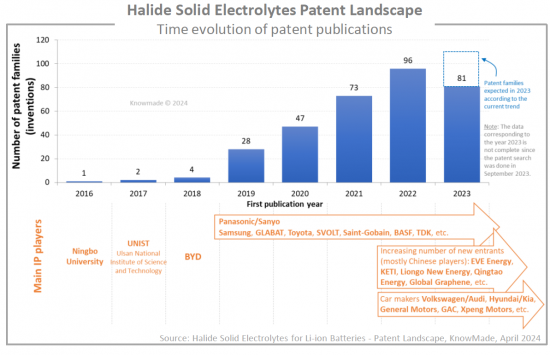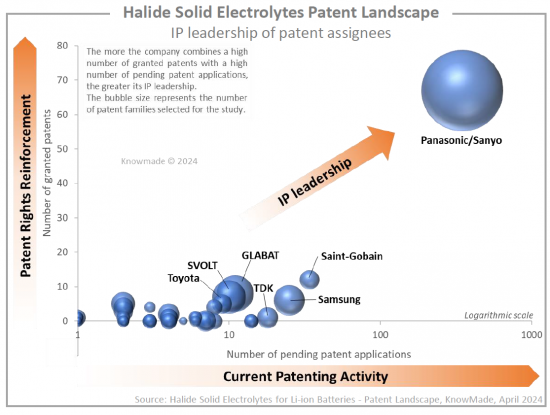|
市场调查报告书
商品编码
1474077
锂离子电池用卤化物固态电解质:专利情形分析(2024年)Halide Solid Electrolytes for Li-ion Batteries Patent Landscape Analysis 2024 |
|||||||
本报告分析了与锂离子电池用卤化物固体电解质相关的专利申请和出版物的趋势,并研究了专利出版物数量(依国家和专利持有人)、依细分市场划分的主要专利持有人和新进者的趋势。专利等)等我们将向您发送一份 Excel 文件,其中总结了要分析的专利(总共超过 330 项)。
卤化物固态电解质:固态电池的一个有前途的选择
近几十年来,固态锂离子电池由于其安全性和高能量密度潜力的显着优势而引起了广泛的关注。具有快速离子传输和优异稳定性的固态电解质(SE)对于这种有前途的下一代锂电池的商业化至关重要。因此,对无机固体电解质如硫化物电解质和氧化物电解质的研究已经积极进行。然而,两者都未能实现电导率和稳定性之间的最佳平衡。氧化物的晶界阻抗高,硫化物的稳定性低。然而,卤化物基固体电解质具有室温离子电导率(>10-3 S.cm-1)、与氧化物正极材料良好的相容性以及优异的化学稳定性和可扩展性,因此被认为是其中之一。
对卤化物固体电解质日益增长的兴趣也透过监测固态锂离子电池相关专利得到证实。截至2023年9月,已公开与锂离子电池卤化物固态电解质材料相关的专利330余项。对于从事固态电池行业的公司来说,现在至关重要的是从技术、竞争和智慧财产权 (IP) 的角度审查这些新兴材料。

什么是专利技术?

本报告分析了主要专利持有者(专利受让人)公司的专利组合实力、主要技术和应用领域。它还概述了专利技术及其使用的现状和趋势。此外,我们还研究了该领域领先企业和新进入者的策略和技术方向。
专利涵盖了要求保护的材料成分(LiMX4、Li3MX6、单独的卤化物材料、带壳的卤化物材料、与其他材料混合的卤化物材料)、要求保护的製造方法(机械化学、共熔、液相)以及课题/解决方案,以及本发明公开了室温下最好的材料/离子电导率。
智慧财产权领导者寥寥无几,智慧财产权新进入者众多
Panasonic/Sanyo在卤化物固体电解质专利方面处于领先地位,竞争对手包括Samsung、GLABAT、SVOLT、Saint-Gobain、TDK。此外,我们的智慧财产权分析使我们能够识别出60 多家在2022 年后首次提交卤化物相关专利的智慧财产权进入者:EVE Energy、Korea Electronics Technology Institute (KETI)、Liongo New Energy、Qingtao Energy Development、Global Graphene等。80%的新专利申请者来自中国。专门的部分重点在于主要公司(Panasonic、Samsung、Saint-Govain、GLABAT、SVOLT、EVE Energy、University of Western Ontario、TDK、Toyota等)持有的智慧财产权组合。对于每一项,我们都提供了与卤化物固体电解质相关的专利组合概述以及关键专利技术的描述。
方便的Excel专利资料库
该报告还包括一个内容广泛的 Excel 资料库,其中包含分析的所有专利。这个方便的专利资料库可进行多标准搜索,包括专利公开号、更新线上资料库的超连结(文字、法律状态等)、优先权日期、标题、摘要、专利受让人、部分(问题/解决方案、材料成分、卤化物)剂型、合成方法等)。
报告提及企业(部分)
Baoneng Group、Baowu Steel Group、BASF、Beijing Institute of Technology、BYD、China Automotive Battery Research Institute、China Electrics、Corning、EVE Energy、FAW (China First Automobile Works)、Global Graphene、GRINM (General Research Institute for Nonferrous Metals)/GRIMAT、GRIREM Advanced Materials、GTC Power、Guolian Automobile Power Battery Research Institute (GLABAT)、Guoxuan High Tech Power Energy/Gotion、Hanyang University、Hyundai/Kia、Institute of Chemistry - Chinese Academy of Sciences、Korea Electronics Technology Institute (KETI)、Liongo New Energy Technology、Nankai University、Nanmu Nanotechnology、Nichia、Panasonic/Sanyo、QingTao Energy Development、Rare Earth Functional Materials Innovation Center、Saint-Gobain、Samsung、Shenzhen University、Silver Leaf Element、Solvay、South University of Science & Technology of China (SUSTech)、SVOLT/Fengchao Energy Technology、TDK、Toyota、Tsinghua Shenzhen International Graduate School、University of Maryland、University of Waterloo、University of Western Ontario、University of Science and Technology of China (USTC)、Xi'an Jiaotong University、Yonsei University、Zengzhou New Century Materials Genome Institute、Zhejiang University等。
目录
介绍
强调
专利状况概览
- 专利公开数量:依时间顺序变化
- 专利申请数量:依国家分类
- 专利持有人的类型
- 主要知识产权公司:依国家/类型
- 新创公司和纯粹的公司
- 主要专利持有者
- 最活跃的智慧财产权公司(2022-2023)
- IP公司时间表
- 新进入的IP公司
- 专利的法律现状
- 智慧财产权领导地位:依国家划分
- 智慧财产权领先地位:依专利持有者划分
- 专利的法律地位和主要公司的活动领域
- 倖存专利的区域分布
- 主要知识产权公司及其知识产权地位
- 专利权人智慧财产权干扰的可能性
- 专利权人的智慧财产权优势
主要IP公司分析
- 表:专利权人专利组合中所描述的材料成分与技术问题
- 主要公司IP概况(IP组合概览及主要专利技术):
- Panasonic/Sanyo
- Samsung
- Saint-Gobain
- Guolian Automobile Power Battery Res. Inst. (GLABAT)
- University of Western Ontario
- SVOLT
- EVE Energy
- TDK
- KETI (Korea Electronics Technology Institute)
- Toyota
- USTC (University of Science and Technology of China)
- Liongo New Energy Technology
- Qingtao Energy Development
- University of Maryland
- BYD
- Global Graphene
- Baowu Steel Group
- Hanyang University
- BASF/University of Waterloo
- Guoxuan High Tech Power Energy/Gotion
- Yonsei University
- BattFlex
- Ningbo University
- XPeng
- FAW
- GAC
- Nichia
- Aichi Steel
- Fujifilm
- Sumitomo/Tanaka
- Hyundai/Kia
- Solvay
- Sidus
- General Motors
- Corning
- University of Dayton
- Volkswagen
- University of Liverpool
附录
- 专利基础知识
- 学期
- 主要知识产权公司:定义和范例
- 固态电池基础知识
- 参考
KnowMade 演示
KEY FEATURES
- PDF >90 slides
- Excel file >300 patent families
- Global patenting trends, including time evolution of patent publications, countries of patent filings, etc.
- Main patent assignees and IP newcomers in the different segments of the supply chain.
- Key players' IP position and the relative strength of their patent portfolio.
- Patents categorized by material composition and technical challenges.
- IP profile of key players (patent portfolio overview, technical coverage, geographical coverage, key patents, etc.)
- Excel database containing all patents analyzed in the report, including patent segmentations and hyperlinks to an updated online database.
Halide solid electrolytes are promising options for solid-state batteries
Solid-state Li-ion batteries have garnered significant attention in recent decades due to their notable advantages of safety and potential for high energy density. Solid electrolytes (SE) with rapid ionic transport and excellent stability are essential for the commercialization of this promising next-generation of Lithium batteries. Hence, there has been extensive exploration of inorganic solid electrolytes, including sulfide- and oxide-based electrolytes. Unfortunately, both have been unable to strike an optimal balance between conductivity and stability. Oxides suffer from high impedance of grain boundaries, while sulfides experience poor stability. However, halide-based solid electrolytes are increasingly being recognized as one of the most promising options for solid-state Li-ion batteries, owing to their decent room temperature ionic conductivity (>10-3 S.cm-1), good compatibility with oxide cathode materials, excellent chemical stability, and scalability.
The increasing interest in halide solid electrolytes has been observed while monitoring patents on solid-state Li-ion batteries. As of September 2023, over 330 patent families have been published on halide solid electrolyte materials for Li-ion batteries. It is now crucial for companies operating in the solid-state battery industry to closely examine these emerging materials from technological, competitive, and intellectual property (IP) perspectives.
In this context, Knowmade is releasing a new patent landscape report that focuses on halide solid electrolyte materials for Li-ion batteries. In this report, Knowmade's analysts have selected and analyzed over 860 patents and patent applications from more than 330 patent families (inventions) filed by 110+ different entities. The report provides a detailed analysis of the IP landscape and noteworthy patents concerning halide solid electrolyte materials. This new IP report is complementary to our previous patent landscape reports and patent monitors on solid-state batteries.

Understanding the main trends, the key players' IP position and IP strategy
IP competition analysis should reflect the vision of players with a strategy to enter and develop their business in the solid-state Li-ion battery market. In this report, Knowmade's analysts provide a comprehensive overview of the competitive IP landscape and latest technological developments in this field. The report covers IP dynamics and key trends in terms of patents applications, patent assignees, filing countries, and patented technologies. It also identifies the IP leaders, most active patent applicants, and new entrants in the IP landscape. The report also sheds light on under-the-radar companies and new players in this field.
What are the patented technologies?

In this report, we analyze the strength of patent portfolios and the technology and application focus of key patent assignees. An overview of the current status and trends of patented technologies and their applications is also provided. Furthermore, the report examines the strategic and technological directions of both leading companies and newcomers in the field.
The patents have been manually categorized according the claimed material compositions (LiMX4, Li3MX6, halide material alone, halide material with a shell, halide material mixed with another material), the claimed manufacturing methods (mechano-chemical, co-melting, liquid-phase), as well as the challenges/solutions and the best materials/ionic conductivities at room temperature disclosed by the inventions.
A few IP leaders and numerous IP newcomers
Panasonic/Sanyo is leading the halide solid electrolytes patent landscape, challenged by Samsung, GLABAT, SVOLT, Saint-Gobain, and TDK. Additionally, the IP analysis allowed us to pinpoint over 60 IP newcomers who filed their first halide-related patents in 2022 or after: EVE Energy, Korea Electronics Technology Institute (KETI), Liongo New Energy, Qingtao Energy Development, Global Graphene, etc. 80% of new entrants in the patent landscape come from China. In a dedicated section, we focus on the IP portfolios held by key players (Panasonic, Samsung, Saint-Gobain, GLABAT, SVOLT, EVE Energy, University of Western Ontario, TDK, Toyota, etc.). For each, we provide an overview of their patent portfolio related to halide solid electrolytes and a description of their key patented technologies.
Useful Excel patent database
This report also includes an extensive Excel database with all patents analyzed in this study. This useful patent database allows for multi-criteria searches and includes patent publication numbers, hyperlinks to an updated online database (original documents, legal status, etc.), priority date, title, abstract, patent assignees, and segments (challenges/solutions, material composition, halide formula, synthesis methods, etc.).
Companies mentioned in the report (non-exhaustive)
Baoneng Group, Baowu Steel Group, BASF, Beijing Institute of Technology, BYD, China Automotive Battery Research Institute, China Electrics, Corning, EVE Energy, FAW (China First Automobile Works), Global Graphene, GRINM (General Research Institute for Nonferrous Metals) / GRIMAT, GRIREM Advanced Materials, GTC Power, Guolian Automobile Power Battery Research Institute (GLABAT), Guoxuan High Tech Power Energy / Gotion, Hanyang University, Hyundai / Kia, Institute of Chemistry - Chinese Academy of Sciences, Korea Electronics Technology Institute (KETI), Liongo New Energy Technology, Nankai University, Nanmu Nanotechnology, Nichia, Panasonic / Sanyo, QingTao Energy Development, Rare Earth Functional Materials Innovation Center, Saint-Gobain, Samsung, Shenzhen University, Silver Leaf Element, Solvay, South University of Science & Technology of China (SUSTech), SVOLT / Fengchao Energy Technology, TDK, Toyota, Tsinghua Shenzhen International Graduate School, University of Maryland, University of Waterloo, University of Western Ontario, University of Science and Technology of China (USTC), Xi'an Jiaotong University, Yonsei University, Zengzhou New Century Materials Genome Institute, Zhejiang University, and more.
TABLE OF CONTENTS
INTRODUCTION
- Context and objectives of the report
- Scope of the report
- Methodology for patent search, selection, and analysis
- Halide Solid Electrolytes
- Chemical composition
- Room temperature ionic conductivity of main halide solid electrolyte materials
- Main properties, advantages and drawbacks
- Challenges and envisioned solutions for main halide solid electrolyte materials
- Main manufacturing methods
HIGHLIGHTS
PATENT LANDSCAPE OVERVIEW
- Time evolution of patent publications
- Patent filings by country
- Typology of patent assignees
- Main IP players per country and typology
- Startups and pure players
- Main patent assignees
- Most active IP players in 2022-2023
- Timeline of IP players
- IP newcomers
- Current legal status of patents
- IP leadership of countries
- IP leadership of patent assignees
- Main players' patent legal status and geographical coverage
- Geographical distribution of alive patents
- Key IP players and their IP position
- IP blocking potential of patent assignees
- IP strength of patent assignees
FOCUS ON KEY IP PLAYERS
- Table showing material compositions and technical challenges mentioned in patent portfolios of patent assignees
- IP profile of key players (IP portfolio overview and key patented technologies):
- Panasonic/Sanyo
- Samsung
- Saint-Gobain
- Guolian Automobile Power Battery Res. Inst. (GLABAT)
- University of Western Ontario
- SVOLT
- EVE Energy
- TDK
- KETI (Korea Electronics Technology Institute)
- Toyota
- USTC (University of Science and Technology of China)
- Liongo New Energy Technology
- Qingtao Energy Development
- University of Maryland
- BYD
- Global Graphene
- Baowu Steel Group
- Hanyang University
- BASF / University of Waterloo
- Guoxuan High Tech Power Energy / Gotion
- Yonsei University
- BattFlex
- Ningbo University
- XPeng
- FAW
- GAC
- Nichia
- Aichi Steel
- Fujifilm
- Sumitomo/ Tanaka
- Hyundai/Kia
- Solvay
- Sidus
- General Motors
- Corning
- University of Dayton
- Volkswagen
- University of Liverpool
ANNEX
- Basic knowledge of patents
- Terminology
- Key IP players: definition and examples
- Essentials on Solid-state Batteries
- Definitions
- Impact of main bulk solid-state battery technical issues on its performances
- Challenges and improvement solutions for bulk solid-state lithium battery
- Overview of main technical issues for bulk solid-state lithium batteries
- Categories of solid electrolytes
- Properties of each solid electrolyte categories
- Overview of main inorganic solid electrolyte materials
- Ionic conductivities of main other inorganic solid electrolyte materials
- Properties of main other inorganic solid electrolyte materials
- Bibliographic references








